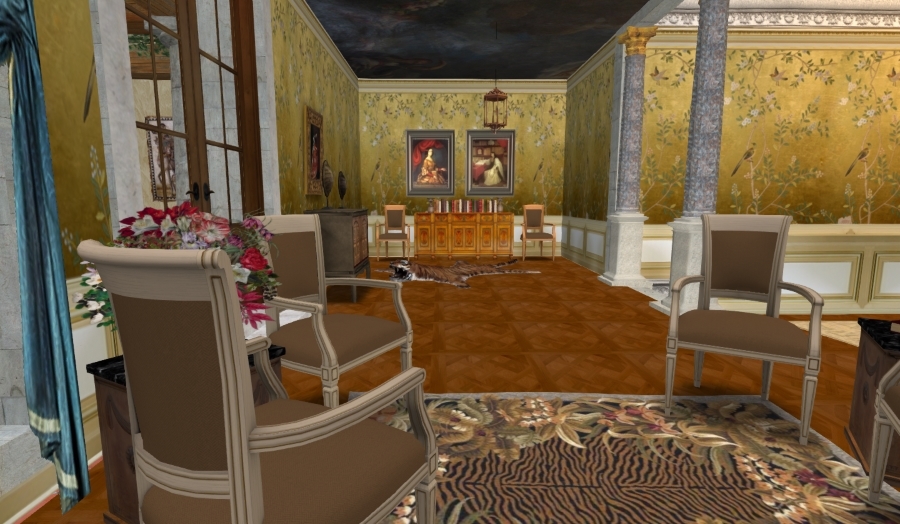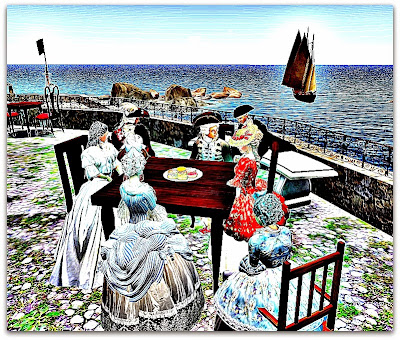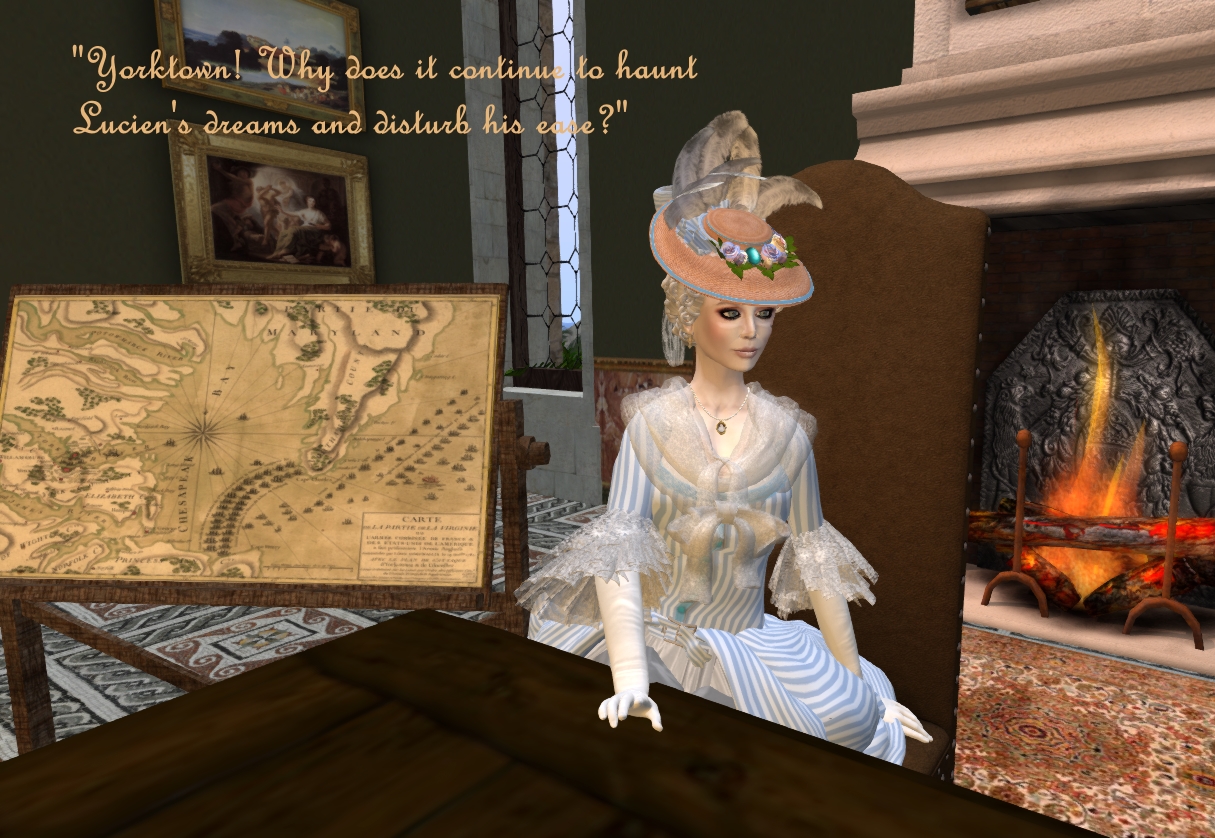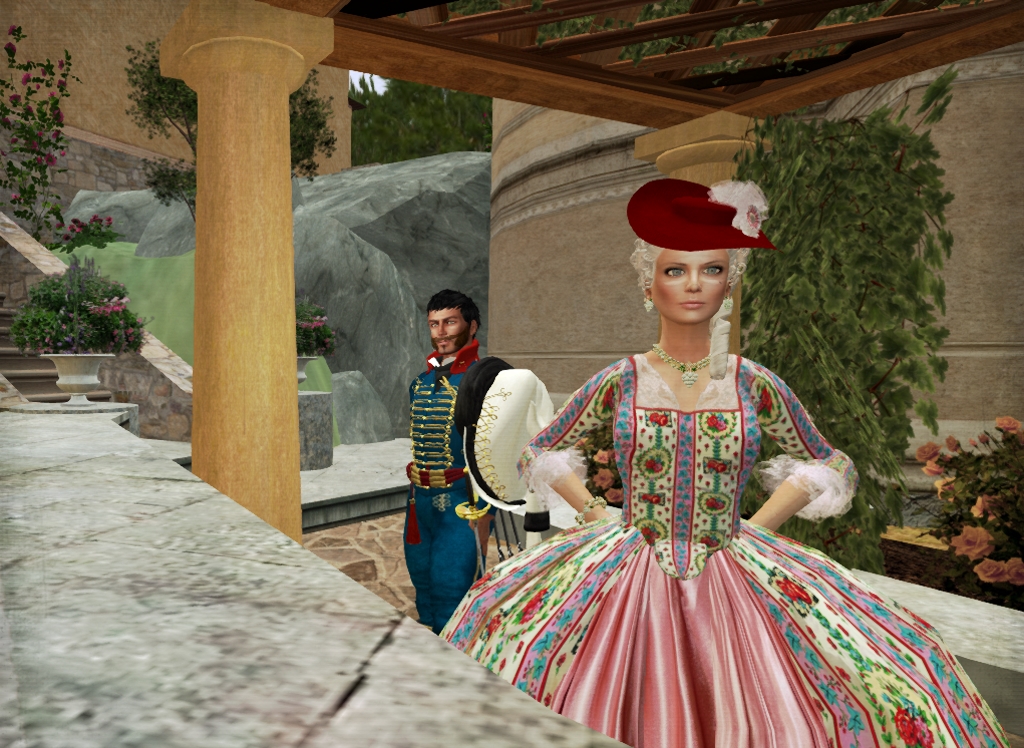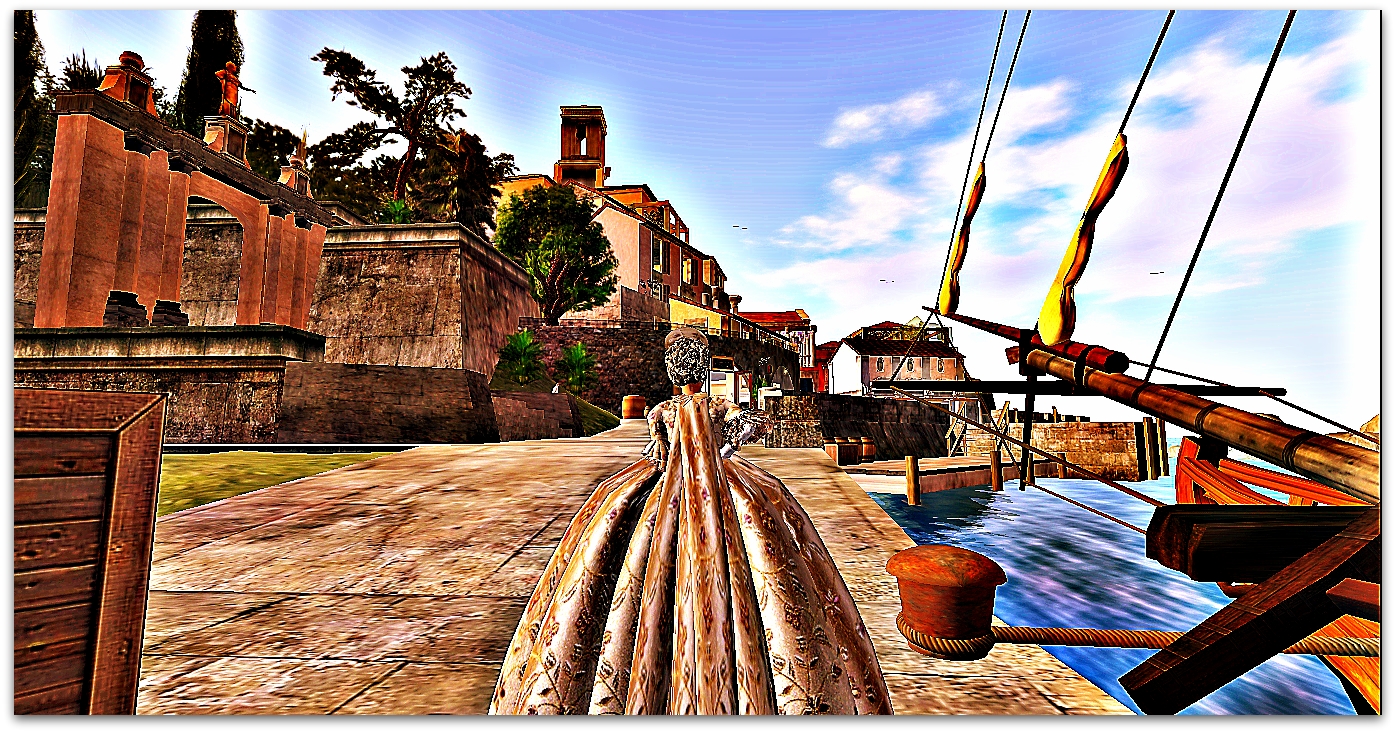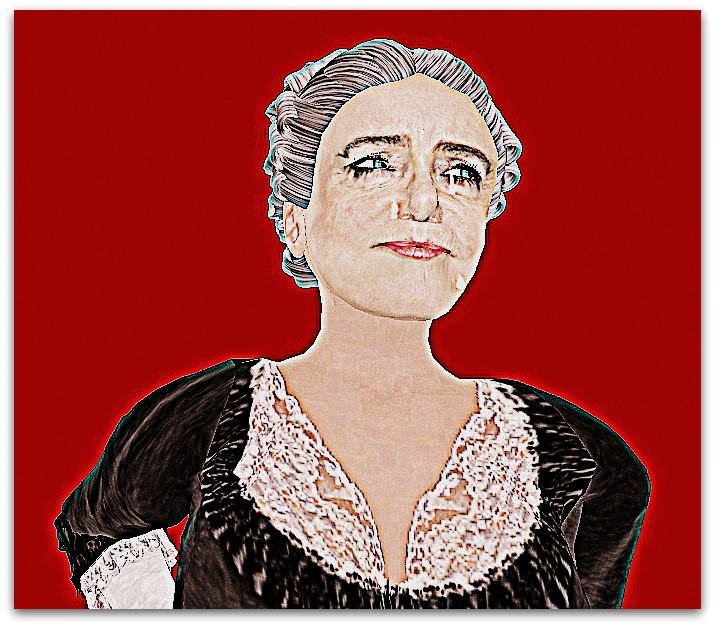Blogs
Furnishing Lucien and Fr. Camara's Rocca Sorrentina apartment - Tigers in the Salon - Rugs Tell a Tale
By Lorsagne de Sade, 2015-05-17
Prior to the Popes formal suppression of the Society of Jesus in 1773, Lorsagnes godfather Jos-Eusebio Camara, SJ functioned as a Jesuit procurator, those members of the society who represented the orders interests to the outside world, administered its properties and maintained its network. After the orders suppression, Fr. Camara and others both within and without the order went about rendering this service quietly, faithfully and often at great risk to their lives.
Lorsagne has used a few of the orders salvaged possessions that hold sentimental value for her godfather in the apartment in Rocca Sorrentina. Foremost among those souvenirs is a tiger skin. Given to the Jesuit by a Moghul viceroy in Hyderabad when Fr. Camara was in India, the skin stands as a symbol of the Hindu god Shivas role as controller of all powers in the world.
A gift of a tiger skin was a compliment of the highest order. Lorsagne uses the hide to dress a corner of the upstairs, placing it on the floor in hopes that her godfather will not take to wearing it andhis plague doctors disguise simultaneously.
The other end of the room is anchored by another sort of tiger skin: an early-18 th century Colonial American hooked rug presented to her companion Lucien Aristide de Robion-Castellane near Yorktown while he was serving as a Lieutenant in a Hussard squadron of the "Legion de Lauzun." Lucien's squadron played a role in deciding the Yorktown campaign in 1781. The pattern of tiger stripes in the hooked wool rug has the same meaning as the hide: courage and strengthcharacteristics of both Camara and Robion-Castellane.
May 1875
My Dear Friend,
It is good to hear from you. Before I address the contents of your letter, let me assure you that all is well here at The Haven. The vineyard looks spectacular and I look forward to the harvest. There have been no callers in your absence, other than that very interesting gentleman from the new world who attended your last salon, Lord Ian. He brought a painting he was hoping to have your opinion of. I was happy to offer him my own view, but he did not seem so interested in my thoughts as yours. Isn't that the way of things? In the end, he left the painting, explaining that he will be traveling for several weeks. He hopes you enjoy it at least for the time is away on business.
It is remarkable that Mrs. Piozzi (although when last I knew her, she was still Lady Thrale) considers any man to be master of any part of her person or her spirit. Oh, yes, she seems to have gone at least temporarily off balance in her devotion to this music teacher, Piozzi. The proof of that is in the mere fact of her rapid and insensible marriage. There is no doubt she is captivated by the man as she never was by her first husband. I still maintain that the only man she has ever seen as her own equal was Dr. Johnson. Of course, she abandoned him in his hour of need as soon as the Italian found his way into her... well... I'll be a lady and call it her heart. I think we both understand that the heart I speak of is located somewhat south of most.
Still, I am sorry to hear of her sad loss. No one should endure such a thing. I would ask you to offer her my condolences, but I fear she would send them back unwelcome. So be it.
As to Capitainede Robion-Castellane's opinion on your spending -- well, surely you anticipated his reaction to your purchases. He is a man who appreciates good taste, but likes to think good taste can be expressed freely without expense. Of course, he is wise enough to realize this is not possible. I suspect he simply enjoys setting you to your fuming. Have you never noticed how the man smiles when your ire is riled? If I were you, I would not worry too much about what he says and pay considerably more attention to what he does.
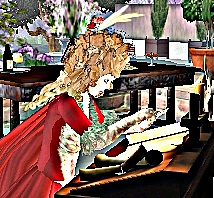 You think me wise, eh? You think I avoid romanticentanglements? If only that were the case. Surely, Lorsagne, you are aware entanglements avoid me, not the other way around.
You think me wise, eh? You think I avoid romanticentanglements? If only that were the case. Surely, Lorsagne, you are aware entanglements avoid me, not the other way around.
And on that lovely note, I will post this letter immediately. Carry on with your shopping and decorating. The money is your own to spend as you see fit. Have you not told me that is one advantage to your status as Chatelaine and bastard child?
Adoringly,
Fanny, who joyously anticipates your return to France
5 May 1785
Dearest Hester, Most Darling of Daughters,
You are much on my mind and so, today, Iburden you with one of Mother Dearest's dear epistles. You may wonder precisely why you are so greatlyin my thoughts this day above all others. I shall tell you.
Last evening, here at the home I share with the world's most marvelous spouse, your former piano teacher, Mr. Piozzi, friends gathered to hear a rather notorious Frenchwoman... she is the bastard daughter of the infamous Marquis de Sade and I have to admit I am most pleasantly surprised to find I rather enjoy the company of this particular bastard; surprised as muchdue the fact of her close friendship with the insipid Frances Burney (You remember that little pecking mouse, my darling?) as the fact of the Frenchwoman's birth in an improper state (the state of bastardity, one might call it) and her religion. This most delightful creature is not only an FOF (friend of Fanny) and a bastard, she is a Catholic! Still, I find her company most pleasing. Her name is, by the way, Lorsagne. Oh dear, it seems I have wandered far off the planned path for this letter, which was to tell you that Lorsagne, the Frenchwoman, read to us all last night. There were several residents of Rocca Sorrentina present to hear the lady. There were the very astute Aldo Stern, who is a professore and magistrate of this village, and Lady Sere Timeless, whose beauty seems to grow with each passing week. There was an older woman who joined us late, Mistress Merry Chase. I find her very amusing and never tire of her freedom with words and opinions. Of course, your new father, my husband, was present. There were several others as well and all were most pleasant company.
Lorsagne read to us from Lady Mary Montague and Lady Sarah Pennington. Both of these women's letters were addressed to their daughters. I know you find me over-bearing sometimes, but I can assure you I am not the mother tyrant Lady Mary Montague appears to be! She is not at all stingy with her advice for her daughters and I am sure they benefit from her wisdom, though I am equally sure they would never acknowledge the benefit. Is this a shared trait of all women with regard to their own mothers?
Best surprise of all was thatMlle. de Sade read to us from Dr. Johnson! (Oh how Imiss my old friend! I do hope you have fond memories of the years he resided in Streatham Park with us. Such a brilliant companion, he was!) The Frenchwoman chose Dr. Johnson's Betty Broom letter. It was a delight, hearing it read aloud once more.
I should also like to tell you that the gathering was held on the Piozzi terrace, overlooking the harbor. The sea air was fresh and warm. There were sea birds all around and a catwho visited from I know not where.I served wonderful fruit tarts purchased from a local baker, along with brandy and, of course, tea. (You see, I have not forgotten I am an English woman -- not for a single moment!) The entire evening was a delight!
I do hope you are well my dear. Please take a few moments to put pen to paper and communicate with your loving Mama. I do so miss my girl.
With Maternal Devotion,
From Mother
Lorsagne confides in Fanny Burney before leaving Lucien and her godfather's new apartment to attend Mrs. Piozzi's soiree
By Lorsagne de Sade, 2015-05-14
Rocca Sorrentina
14 May 1785
Dearest Fanny,
The scent of the sea breezes and the blue of the Mediterranean sky bring me warmth as I rest from my labors furnishing the new apartments on the island in order to deliver greetings to you from Mrs. Piozzi and her delightful husband Signor Piozzi. 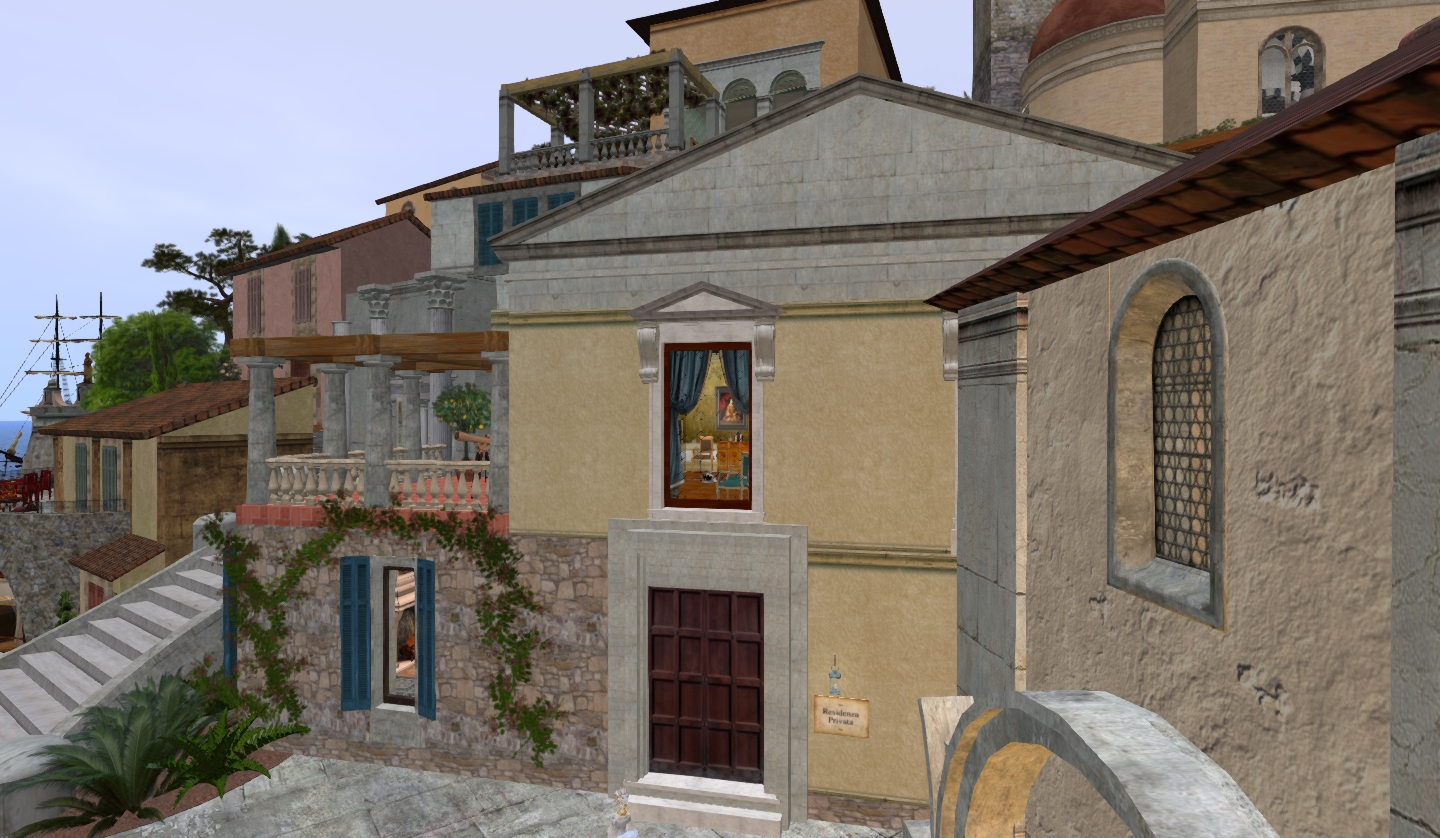
That good lady has asked me to provide entertainment this very day for a gathering of notables in her delightful residence here on the island. I am flattered, for the lady has many in her acquaintance with far greater talents and of wider knowledge of the world than your simple friend. However, I shall endeavor to acquit myself favorably, for I do so wish to be included in her circle.
I had hoped Lucien would accompany me to this evenings soiree, but he is nowhere to be found. Only his infernal maps give evidence that he has even visited his new pied a Terre that I have labored longand with some success I believeto furnish for his and godfathers comfort, as well as their shelter.
When I arrived at the apartment after meeting with yet another draper who wishes to win my trade, the beautiful map of Paris drawn in the year 1600 that I brought from The Haven had been put away. Yet another map showing troop placements during the siege of Yorktown in the new United States had taken its place on Luciens chart table.
Yorktown! Why does it continue to haunt Luciens dreams and disturb his ease? Luciens company of Hussars with Lafayette and de Rochambeau's decisions as his commanders made no small contribution to the victory, yet Lucien takes no satisfaction in victory. I confide to you that on his return I hardly knew him so changed was he in his opinions and his outlook. He now has my fear for his soul, as well as my heart, so I will put my own impatience aside and strive to forbear his moods and his absence.
Still, Lorsagne as the patient Griselda? I think not! Only a man would flatter himself so. Foolish creatures. Perhaps my motives in the choice of decoration for the walls in repaire masculin I have furnished for Lucien and godfather will not be lost on at least one of those good gentlemen. 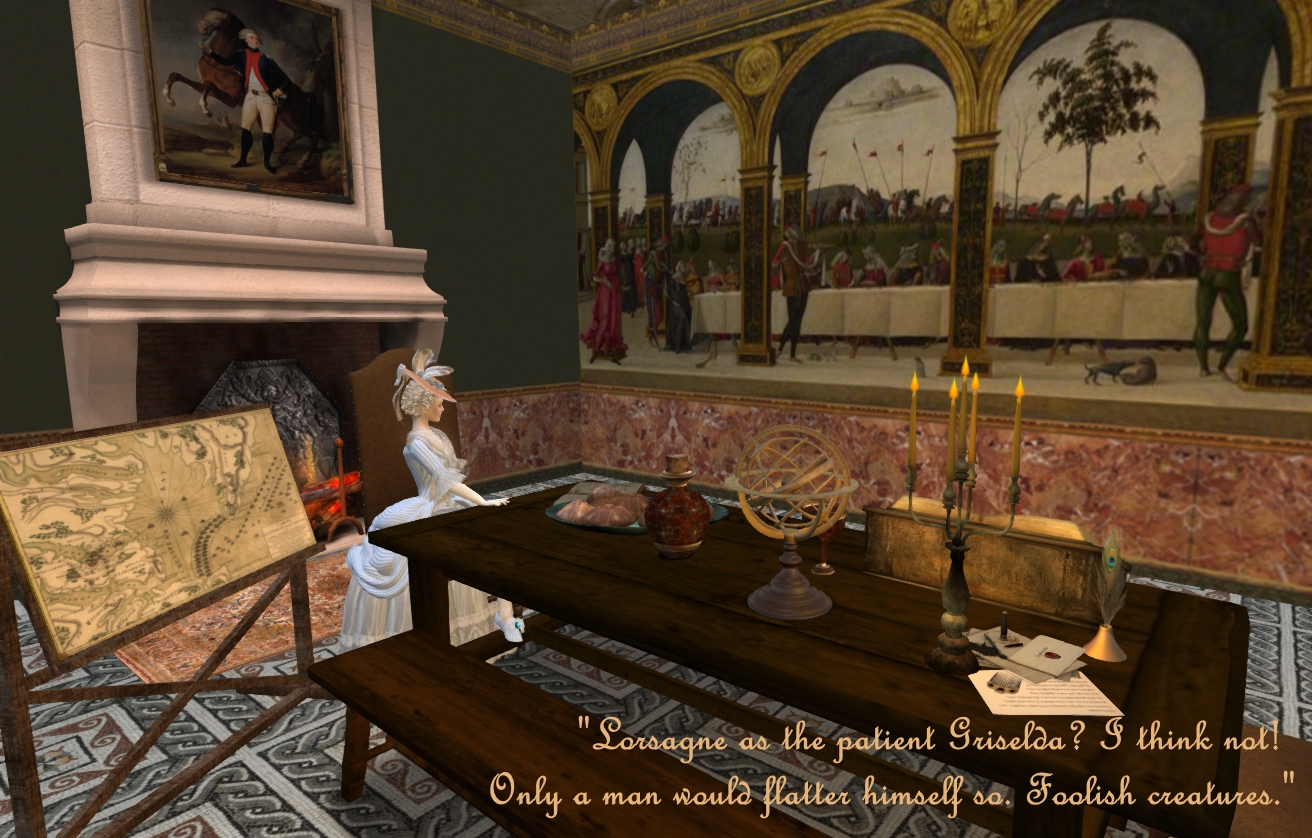
I close now to make my toilette for todays gathering at Mrs. Ps.
As ever, your devoted friend,
Lorsagne
Arriving in Rocca Sorrentina, Lorsagne writes to Fanny Burney, reporting on Mrs. Piozzi's recovery and her "great good friend" Lucien's criticism of her extravagance
By Lorsagne de Sade, 2015-05-05
April of 1785
Rocca Sorrentina
Dearest Fanny,
I write you in haste having only arrived in Rocca Sorrentina the previous day. As you can imagine, I find myself as yet unsettled. Oh, that I could make the journey from The Haven to this lovely island as does a bird, with wings instead of bouncing over waters that invariably roil up to torment my constitution or find my spine jarred by the ruts and rocks as I ride trapped inside a coach that invariably loses at least one wheel in the journey.
Yet, as always, the islands beauty and the company of its residents compensate for these inconveniences.
Since my arrival, I have seen your friend Mrs. Piozzi briefly. She is pale, yet I note that she projects serenity even in her time of loss. I judge her to be a woman great inner strength and look forward to developing cordial relations both with the lady and her husband. I have yet to meet the noted singer, but from the expression on Mrs. Ps face when she speaks of him, he is most obviously the master of her heart, the source of her comfort, and the companion of her intellect.
Capitaine Lucien de Robion-Castellane would do well to emulate the gentleman. I must confide in you that I find myself quite put out with Lucien. He has just arrived on the island on leave from his responsibilities to the Marquis de Lafayette. After the briefest of greetings after a long absence he has commenced to tell me that the costs of furnishings that I have purchased or commissioned for the apartments he and godfather are to share in Rocca Sorrentina are intemperate! Excessive! Immodest!
I assure you I have purchased only the barest of essentials and have exercised admirable frugality. I cannot be faulted. No, and I have not put my hand into the Captains purse for even the smallest of domestic expenses.
Men! They want us to make them homes of beauty, taste, comfort and a certain degree of luxury without expense. They want us to maintain our faces, our figures, and our wardrobes to the standards of the latest court fashions. And they expect us to do it all on a paupers purse. I would ask godfather to intercede, yet my intuition tells me I will not have an ally in the Jesuit in this matter.
That godfather and Lucien will be sharing quarters is both a delight and a something of a worry to me. I can manage each of them to my advantage when they are separated by time and distance. I suspect they will join forces in an attempt to reign in their charge once they are living under the same roof.
You are wise to avoid romantic entanglements, dear Fanny. A papa that holds you tightly is enough of a restriction to your freedom!
Until I can return to enjoy the pleasures your company and my duties at my beloved Haven,
Lorsagne

It took just over two years to construct the Eiffel Tower (January 28, 1887 to March 15, 1889). Given that the conception, planning, politics & design commenced around 1884, this cultural icon in the making was actually a "work in progress" for at least five years.
I'd like to think that Gustave Eiffel enjoyed at least part of this journey.
4 April 1785
Dearest Gabriel,
Storms at sea do not make for the most pleasant of travel experiences. Still, the food aboard was tolerable and the ship's crew were most conscientious about seeing to the needs and safety of passengers. My back is sore and I miss my husband mightily. At least I have a home to which I could return to tend to my niggling complaints. That makes me far better off than many of my travel companions headed on to Marseilles.
I hope this morning finds you well and happy in Salzburg and that the remainder of our journey will be easy. I look forward to hearing from you once you are settled in at the opera house. I will yearn for you until we are together once more.
Your adoring and obedient wife,
Hester
2 April 1785
11March 1785
Il Mio Piu Caro Moglie,
Lady Whitby has written me of our great loss. I understand you wish me to stay where I am, singing and teaching as though I had not experienced the same loss that you, my Love, now face. I want to assure you that I am suffering as deeply as you, Mia Moglie. There is no point to suffering alone when we can heal together. Marchesi happens to bein Salzburgand has agreed to come to Vienna. He will step in for me until such time as it is sensible for me to return to my work. I will be on the first coach after his arrival in Vienna and will soon join you at theVilla Anglaise. Know, my Dearest, ti amo l'inverno e la primavera.
I will see you in just a few days.
Your Adoring and Devoted Husband,
Gabriel
5 March 1785
Dear Mr. Piozzi,
I fear there is no way to begin this missive that would not simply delay the horrible sadness it is meant to convey. I fear I must offer my condolences on the loss of your wife's pregnancy. I fear the worst we all feared came to pass less than 24 hours after your departure for Vienna. Hester started that next day well, rising with the sun and breaking her fast with Lord Whitby before this old woman had even risen from her sleep. Lord Geoffrey tells me that there was no sign of discomfort or ill omen when he shared the morning meal that day with Hester. She felt well enough to take the morning sun in my garden, reading as she did so from one of those novels she loves so very well. By midday, when I arose, she was not looking well and complained of indigestion which soon turned to pains wicked enough to fold the lady in two. We sent for the dottore, who arrived with great haste. Still, he was too late. By the time, he arrived, Hester had birthed the child, dead, of course.
I can assure you that Hester is now resting comfortably. The doctor offered her laudunum, which she refused, saying she wanted to keep her wits even through her pain and grief. A wise choice, if you ask me. There was never a moment when it seemed we might lose your dear wife. She was strong throughout this ghastly ordeal. Of course, I remember this is not Hester's first loss of a child. Still, it is very hard on her. Doctor says there should be no more attempts at growing your family. I imagine he will want to speak with you when you arrive.
Hester asked me to tell you not to leave Vienna until your work there is done. She insists you must stay and sing and teach and carry on as if nothing has happened. This is, of course, absurd. Mr. Piozzi. Your wife needs to see you post haste. She simply must face her worst fears about teh affect this loss will have on you and, by extension, your young marriage. Hester has not said she fears your reaction to the loss, but I know from many years experience that every woman fears the loss of her husband's devotion. You must come to our Villa Anglaise as soon as you can be freed of your professional responsibilities so that you can reassure Hester that nothing between you will change. You love her now as you always have. Of that, there can be no doubt.
Please write to your wife to let her know of your plans. You will be in my thoughts, Mr. Piozzi. I'll see to Hester until you can be at her side.
Most Sincerely,
Lady Agnes Whitby

